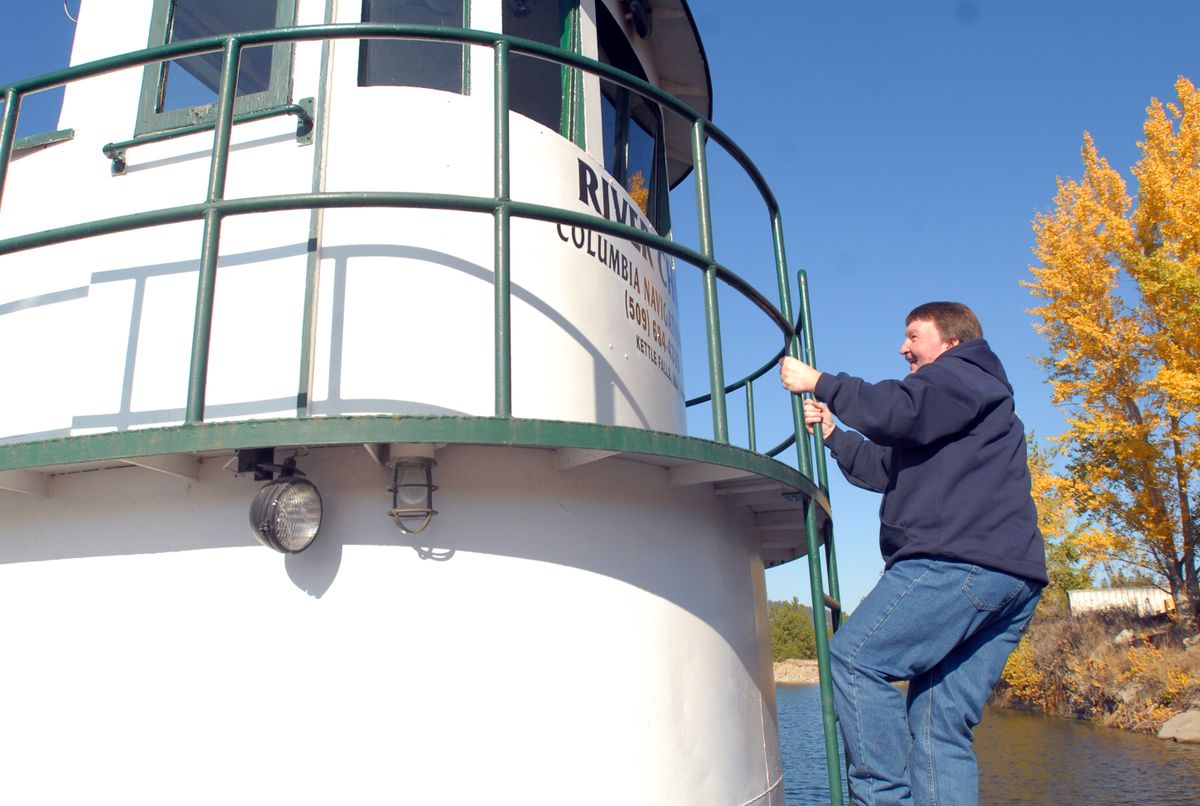Surgery a ‘fresh start’
Kettle Falls man pursues rare procedure

KETTLE FALLS, Wash. – The doctor’s words left Eric Weatherman speechless.
Your sex life will cease, the doctor told him. Your limbs will be amputated. You’ll lose your eyesight. Your kidneys will fail, and you will die.
“I’ll never forget it. Brought me to my knees,” Weatherman said. “I was a raging diabetic.”
Diabetes had already killed his father, an uncle and his grandfather.
And the doctor prompted Weatherman to take account of his blessings: a wife, two sons in college, a successful business and a town full of friends who once elected him mayor.
He decided right then to radically change his life, and he called a surgeon in San Francisco.
He is now a number within this expanding statistic: 200,000 Americans are expected to undergo weight-loss operations this year.
Weatherman had ballooned to 430 pounds before turning to bariatric surgery – specifically, a procedure called the “duodenal switch.”
It’s not the bariatric procedure most commonly performed in Spokane, but he carefully researched his options and chose to travel to San Francisco in August. There, Dr. John Rabkin used laparoscopic surgery to cut away part of Weatherman’s stomach and reconfigured his intestines so that his body absorbs fewer calories.
He was in San Francisco for a week. His only scars are three dime-size blemishes and a small line inside his navel.
Last week, Weatherman, 45, was back at his high school weight of 300 for the first time in 27 years.
Weatherman was born big. He’s the husky kid in pictures.
In high school he played center on the offensive line for the Kettle Falls Bulldogs. When the team was on defense he turned around and dropped anchor as nose tackle. The game program listed him at 265 pounds. “That’s what it said, but I was all of 300,” he said.
Now he’s shedding pounds by the day. His waist has shrunk 12 inches. The banisters in his house are stacked with new clothes, including blue jeans and button-down shirts he hasn’t pulled the tags off yet. Many are going back out the door as donations to Goodwill – they’re already too big.
While weight loss is the visible difference in Weatherman’s appearance, the radical changes are on the inside. His diabetes is under control.
For health’s sake
Federal statistics peg the number of morbidly obese Americans at 15 million. While many more are categorized as overweight, “morbidly obese” is used to describe people with a body mass index of 40.
The BMI, a weight-height ratio, is widely used as a way to determine appropriate weight ranges. A BMI over 25 is considered overweight, although surgeries are not recommended for people who score under 40, unless they have other factors such as diabetes or heart disease.
Dr. Matt Rawlins, a bariatric surgeon with the Rockwood Clinic, said the procedures are not offered for cosmetic reasons. Rather, he said, they’re performed to reverse medical conditions caused by obesity.
Rockwood surgeons don’t perform the duodenal switch. They perform gastric bypasses that help patients lose between 60 percent and 85 percent of their excess weight.
Rawlins worries about the nutritional risks associated with the duodenal switch.
Besides reducing stomach size, surgeons reroute a lengthy portion of the small intestine. They create two separate pathways, one emptying the stomach and the other carrying liver bile, which normally helps the body absorb nutrients from food in the small intestine. By keeping bile away from stomach contents until just before the small intestine dumps into the large intestine, the food – and calories – is not absorbed normally.
The downside: Duodenal switch patients must take supplements to ensure their bodies receive enough nutrients. Most patients will end up relying on regular medical monitoring to ensure they are healthy.
With all bariatric surgery, there’s also the issue of cost. The procedures can run thousands or even tens of thousands of dollars. Many insurers consider bariatric surgery an elective procedure rather than medically necessary and don’t cover it.
Weatherman said a downside of the surgery for him is a lack of medical and social support in Eastern Washington.
“People should know about this surgery, because it is saving my life,” he said. “And I hope there are others out there who are like me and want to talk about what’s happening. Let’s share information.”
One benefit of the surgery, Weatherman said, is that it does not force patients to drastically alter their diets.
Most of his favorite foods are allowed. He has always been a “high-protein, high-fat” eater. “You know, meat and potatoes with plenty of butter,” he said.
He simply can’t eat as much because of his smaller stomach.
A couple of weeks ago he made a pot of cream of potato soup, attempting to copy a dish at a favorite restaurant.
“When I had it just right,” Weatherman said, “I poured a great big bowl, ate a few spoonfuls, and you know what, that was enough.
“For me, that’s unbelievable. I was the kind of guy that would pull a carton of ice cream from the freezer and be like, ‘Why dirty a dish?’ ”
A need to help – and to ride a bike
Weatherman has a few simple goals. On a personal level, he looks forward to riding a bike. His recreational pursuits in the past have been centered on motorized transportation: snowmobiles, boats, ATVs. “I’ve wanted to ride a bike my entire life,” he said.
He also wants to give back to his community. His tugboat business, Columbia Navigation, has been successful. Weatherman is already a Kettle Falls fixture. He’s active in service groups and youth activities.
Now he wants to start an Eastern Washington support group, even establish a foundation to foster education and financial assistance to people who need bariatric surgery.
“I’ve been given this fresh start,” he said, “and now I need to help others.”